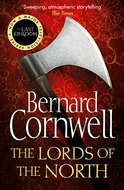Kitap dosya olarak indirilemez ancak uygulamamız üzerinden veya online olarak web sitemizden okunabilir.
Kitabı oku: «The Last Kingdom Series Books 1-6», sayfa 28
‘Whatever a missal is,’ I said, pretending ignorance.
‘A book of prayers,’ he said, ‘and you will need prayers if you touch her.’ He made the sign of the cross. ‘She is evil,’ he said vehemently.
‘She’s a queen, a young queen,’ I said, ‘so how can she be evil?’
‘What do you know of the Britons?’
‘That they stink like stoats,’ I said, ‘and thieve like jackdaws.’
He gave me a sour look and, for a moment, I thought he would refuse to say more, but he swallowed his British pride. ‘We are Christians,’ he said, ‘and God be thanked for that great mercy, but among our people there are still some old superstitions. Pagan ways. Iseult is part of that.’
‘What part?’
He did not like talking about it, but he had raised the subject of Iseult’s evil and so he reluctantly explained. ‘She was born in the springtime,’ he said, ‘eighteen years ago, and at her birth there was an eclipse of the sun, and the folk here are credulous fools and they believe a dark child born at the sun’s death has power. They have made her into a,’ he paused, not knowing the Danish word, ‘a gwrach,’ he said, a word that meant nothing to me. ‘Dewines,’ he said irritably and, when I still showed incomprehension, he at last found a word. ‘A sorceress.’
‘A witch?’
‘And Peredur married her. Made her his shadow queen. That is what kings did with such girls. They take them into their households so they may use their power.’
‘What power?’
‘The skills the devil gives to shadow queens, of course,’ he said irritably. ‘Peredur believes she can see the future. But it is a skill she will retain only so long as she is a virgin.’
I laughed at that. ‘If you disapprove of her, monk, then I would be doing you a favour if I raped her.’ He ignored that, or at least he made no reply other than to give me a harsh scowl. ‘Can she see the future?’ I asked.
‘She saw you victorious,’ he said, ‘and told the king he could trust you, so you tell me?’
‘Then assuredly she can see the future,’ I said.
Brother Asser sneered at that answer. ‘They should have strangled her with her own birth-cord,’ he snarled. ‘She is a pagan bitch, a devil’s thing, evil.’
There was a feast that night, a feast to celebrate our pact and I hoped Iseult would be there, but she was not. Peredur’s older wife was present, but she was a sullen, grubby creature with two weeping boils on her neck and she hardly spoke. Yet it was a surprisingly good feast. There was fish, beef, mutton, bread, ale, mead and cheese, and while we ate Asser told me he had come from the kingdom of Dyfed, which lay north of the Sæfern Sea, and that his king, who had an impossible British name which sounded like a man coughing and spluttering, had sent him to Cornwalum to dissuade the British kings from supporting the Danes.
I was surprised by that, so surprised that I looked away from the girls serving the food. A harpist played at the hall’s end and two of the girls swayed in time to the music as they walked. ‘You don’t like Danes,’ I said.
‘You are pagans,’ Asser said scornfully.
‘So how come you speak the pagan tongue?’ I asked.
‘Because my abbot would have us send missionaries to the Danes.’
‘You should go,’ I said. ‘It would be a quick route to heaven for you.’
He ignored that. ‘I learned Danish among many other tongues,’ he said loftily, ‘and I speak the language of the Saxons too. And you, I think, were not born in Denmark?’
‘How do you know?’
‘Your voice,’ he said. ‘You are from Northumbria?’
‘I am from the sea,’ I said.
He shrugged. ‘In Northumbria,’ he said severely, ‘the Danes have corrupted the Saxons so that they think of themselves as Danes.’ He was wrong, but I was scarcely in a position to correct him. ‘Worse,’ he went on, ‘they have extinguished the light of Christ.’
‘Is the light of Thor too bright for you?’
‘The West Saxons are Christians,’ he said, ‘and it is our duty to support them, not because of a love for them, but because of our fellow love for Christ.’
‘You have met Alfred of Wessex?’ I asked sourly.
‘I look forward to meeting him,’ he said fervently, ‘for I hear he is a good Christian.’
‘I hear the same.’
‘And Christ rewards him,’ Asser went on.
‘Rewards him?’
‘Christ sent the storm that destroyed the Danish fleet,’ Asser said, ‘and Christ’s angels destroyed Ubba. That is proof of God’s power. If we fight against Alfred then we range ourselves against Christ, so we must not do it. That is my message to the kings of Cornwalum.’
I was impressed that a British monk at the end of the land of Britain knew so much of what happened in Wessex, and I reckoned Alfred would have been pleased to hear Asser’s nonsense, though of course Alfred had sent many messengers to the British. His messengers had all been priests or monks and they had preached the gospel of their god slaughtering the Danes, and Asser had evidently taken up their message enthusiastically. ‘So why are you fighting Callyn?’ I asked.
‘He would join the Danes,’ Asser said.
‘And we’re going to win,’ I said, ‘so Callyn is sensible.’
Asser shook his head. ‘God will prevail.’
‘You hope,’ I said, touching the small amulet of Thor’s hammer I wore on a thong around my neck. ‘But if you are wrong, monk, then we’ll take Wessex and Callyn will share the spoils.’
‘Callyn will share nothing,’ Asser said spitefully, ‘because you will kill him tomorrow.’
The Britons have never learned to love the Saxons. Indeed they hate us, and in those years when the last English kingdom was on the edge of destruction, they could have tipped the balance by joining Guthrum. Instead they held back their sword arms, and for that the Saxons can thank the church. Men like Asser had decided that the Danish heretics were a worse enemy than English Christians, and if I were a Briton I would resent that, because the Britons might have taken back much of their lost lands if they had allied themselves with the pagan Northmen. Religion makes strange bedfellows.
So does war, and Peredur offered Haesten and myself two of the serving girls to seal our bargain. I had sent Cenwulf back to Fyrdraca with a message for Leofric, warning him to be ready to fight in the morning, and I thought perhaps Haesten and I should retreat to the ship, but the serving girls were pretty and so we stayed, and I need not have worried for no one tried to kill us in the night, and no one even tried when Haesten and I carried the first third of the silver down to the water’s edge where a small boat carried us to our ship. ‘There’s twice as much as that waiting for us,’ I told Leofric.
He stirred the sack of silver with his foot. ‘And where were you last night?’
‘In bed with a Briton.’
‘Earsling,’ he said. ‘So who are we fighting?’
‘A pack of savages.’
We left ten men as ship guards. If Peredur’s men made a real effort to capture Fyrdraca then those ten would have had a hard fight, and probably a losing fight, but they had the three hostages who may or may not have been Peredur’s sons, so that was a risk we had to take, and it seemed safe enough because Peredur had assembled his army on the eastern side of the town. I say army, though it was only forty men, and I brought thirty more, and my thirty were well armed and looked ferocious in their leather. Leofric, like me, wore mail, as did half a dozen of my crewmen, and I had my fine helmet with its face-plate so I, at least, looked like a lord of battles.
Peredur was in leather, and he had woven black horsetails into his hair and onto the twin forks of his beard so that the horsetails hung down wild and long and scary. His men were mostly armed with spears, though Peredur himself possessed a fine sword. Some of his men had shields and a few had helmets, and though I did not doubt their bravery I did not reckon them formidable. My crewmen were formidable. They had fought Danish ships off the Wessex coast and they had fought in the shield wall at Cynuit and I had no doubt that we could destroy whatever troops Callyn had placed in Dreyndynas.
It was afternoon before we climbed the hill. We should have gone in the morning, but some of Peredur’s men were recovering from their night’s drinking, and the women of his settlement kept pulling others away, not wanting them to die, and then Peredur and his advisers huddled and talked about how they should fight the battle, though what there was to talk about I did not know. Callyn’s men were in the fort, we were outside it, so we had to assault the bastards. Nothing clever, just an attack, but they talked for a long time, and Father Mardoc said a prayer, or rather he shouted it, and then I refused to advance because the rest of the silver had not been fetched.
It came, carried in a chest by two men, and so at last, under the afternoon sun, we climbed the eastern hill. Some women followed us, shrieking their battle-screams, which was a waste of breath because the enemy was still too far away to hear them.
‘So what do we do?’ Leofric asked me.
‘Form a wedge,’ I guessed. ‘Our best men in the front rank and you and me in front of them, then kill the bastards.’
He grimaced. ‘Have you ever assaulted one of the old people’s forts?’
‘Never.’
‘It can be hard,’ he warned me.
‘If it’s too hard,’ I said, ‘we’ll just kill Peredur and his men and take their silver anyway.’
Brother Asser, his neat black robes muddied about their skirts, hurried over to me. ‘Your men are Saxons!’ he said accusingly.
‘I hate monks,’ I snarled at him. ‘I hate them more than I hate priests. I like killing them. I like slitting their bellies. I like watching the bastards die. Now run off and die before I cut your throat.’
He ran off to Peredur with his news that we were Saxons. The king stared at us morosely. He had thought he had recruited a crew of Danish Vikings, and now he discovered we were West Saxons and he was not happy, so I drew Serpent-Breath and banged her blade against my limewood shield. ‘You want to fight this battle or not?’ I asked him through Asser.
Peredur decided he wanted to fight, or rather he wanted us to fight the battle for him, and so we slogged on up the hill which had a couple of false crests so it was well into the afternoon before we emerged onto the long, shallow summit and could see Dreyndynas’s green turf walls on the skyline. A banner flew there. It was a triangle of cloth, supported on its pole by a small cross-staff, and the banner showed a white horse prancing on a green field.
I stopped then. Peredur’s banner was a wolf’s tail hung from a pole, I carried none, though, like most Saxons, mine would have been a rectangular flag. I only knew one people who flew triangular banners and I turned on Brother Asser as he sweated up the hill. ‘They’re Danes,’ I accused him.
‘So?’ he demanded. ‘I thought you were a Dane, and all the world knows the Danes will fight anyone for silver, even other Danes. But are you frightened of them, Saxon?’
‘Your mother didn’t give birth to you,’ I told him, ‘but farted you out of her shrivelled arsehole.’
‘Frightened or not,’ Asser said, ‘you’ve taken Peredur’s silver, so you must fight them now.’
‘Say one more word, monk,’ I said, ‘and I’ll cut off your scrawny balls.’ I was gazing uphill, trying to estimate numbers. Everything had changed since I had seen the white horse banner because instead of fighting against half-armed British savages we would have to take on a crew of lethal Danes, but if I was surprised by that, then the Danes were equally surprised to see us. They were crowding Dreyndynas’s wall, which was made of earth fronted with a ditch and topped with a thorn fence. It would be a hard wall to attack, I thought, especially if it was defended by Danes. I counted over forty men on the skyline and knew there would be others I could not see, and the numbers alone told me this assault would fail. We could attack, and we might well get as far as the thorn palisade, but I doubted we could hack our way through, and the Danes would kill a score of us as we tried, and we would be lucky to retreat down the hill without greater loss.
‘We’re in a cesspit,’ Leofric said to me.
‘Up to our necks.’
‘So what do we do? Turn on them and take the money?’
I did not answer because the Danes had dragged a section of the thorn fence aside and three of them now jumped down from the ramparts and strolled towards us. They wanted to talk.
‘Who the hell is that?’ Leofric asked.
He was staring at the Danish leader. He was a huge man, big as Steapa Snotor, and dressed in a mail coat that had been polished with sand until it shone. His helmet, as highly polished as his mail, had a face-plate modelled as a boar’s mask with a squat, broad snout, and from the helmet’s crown there flew a white horsetail. He wore arm rings over his mail, rings of silver and gold that proclaimed him to be a warrior chief, a sword-Dane, a lord of war. He walked the hillside as if he owned it, and in truth, he did own it because he possessed the fort.
Asser hurried to meet the Danes, going with Peredur and two of his courtiers. I went after them and found Asser trying to convert the Danes. He told them that God had brought us and we would slaughter them all and their best course was to surrender now and yield their heathen souls to God. ‘We shall baptise you,’ Asser said, ‘and there will be much rejoicing in heaven.’
The Danish leader slowly pulled off his helmet and his face was almost as frightening as the boar-snouted mask. It was a broad face, hardened by sun and wind, with the blank, expressionless eyes of a killer. He was around thirty years old, had a tightly-cropped beard and a scar running from the corner of his left eye down across his cheek. He gave the helmet to one of his men and, without saying a word, hauled up the skirt of his mail coat and began pissing on Asser’s robe. The monk leaped back.
The Dane, still pissing, looked at me. ‘Who are you?’
‘Uhtred Ragnarson. And you?’
‘Svein of the White Horse,’ he said it defiantly, as though I would know his reputation, and for a heartbeat I said nothing. Was this the same Svein who was said to be gathering troops in Wales? Then what was he doing here?
‘You’re Svein of Ireland?’ I asked.
‘Svein of Denmark,’ he said. He let the mail coat drop and glared at Asser who was threatening the Danes with heaven’s vengeance. ‘If you want to live,’ he told Asser, ‘shut your filthy mouth.’ Asser shut his mouth. ‘Ragnarson,’ Svein looked back to me. ‘Earl Ragnar? Ragnar Ravnson? The Ragnar who served Ivar?’
‘The same,’ I said.
‘Then you are the Saxon son?’
‘I am. And you?’ I asked. ‘You’re the Svein who has brought men from Ireland?’
‘I have brought men from Ireland,’ he admitted.
‘And gather forces in Wales?’
‘I do what I do,’ he said vaguely. He looked at my men, judging how well they would fight, then he looked me up and down, noting my mail and helmet, and noting especially my arm rings, and when the inspection was done he jerked his head to indicate that he and I should walk away a few paces and talk privately.
Asser objected, saying anything that was spoken should be heard by all, but I ignored him and followed Svein uphill. ‘You can’t take this fort,’ Svein told me.
‘True.’
‘So what do you do?’
‘Go back to Peredur’s settlement, of course.’
He nodded. ‘And if I attack the settlement?’
‘You’ll take it,’ I said, ‘but you’ll lose men. Maybe a dozen?’
‘Which will mean a dozen fewer oarsmen,’ he said, thinking, and then he looked past Peredur to where two men carried the box. ‘Is that your battle price?’
‘It is.’
‘Split it?’ he suggested.
I hesitated a heartbeat. ‘And we’ll split what’s in the town?’ I asked.
‘Agreed,’ he said, then looked at Asser who was hissing urgently at Peredur. ‘He knows what we’re doing,’ he said grimly, ‘so a necessary deception is about to happen.’ I was still trying to understand what he meant when he struck me in the face. He struck hard, and my hand went to Serpent-Breath and his two men ran to him, swords in hand.
‘I’ll come out of the fort and join you,’ Svein said to me softly. Then, louder, ‘You bastard piece of goat-dropping.’
I spat at him as his two men pretended to drag him away, then I stalked back to Asser. ‘We kill them all,’ I said savagely. ‘We kill them all!’
‘What did he say to you?’ Asser asked. He had feared, rightly as it happened, that Svein and I had made our own alliance, but Svein’s quick display had put doubts in the monk’s mind, and I fed the doubts by raging like a madman, screaming at the retreating Svein that I would send his miserable soul to Hel who was the goddess of the dead. ‘Are you going to fight?’ Asser demanded.
‘Of course we’re going to fight!’ I shouted at him, then I crossed to Leofric. ‘We’re on the same side as the Danes,’ I told him quietly. ‘We kill these Britons, capture their settlement and split everything with the Danes. Tell the men, but tell them quietly.’
Svein, true to his word, brought his men out of Dreyndynas. That should have warned Asser and Peredur of treachery, for no sensible man would abandon a fine defensive position like a thorn-topped earth wall to fight a battle on open ground, but they put it down to Danish arrogance. They assumed Svein believed he could destroy us all in open battle, and he made that assumption more likely by parading a score of his men on horseback, suggesting that he intended to tear our shield wall open with his swords and axes and then pursue the survivors with spear-armed cavalry. He made his own shield wall in front of the horsemen, and I made another shield wall on the left of Peredur’s line, and once we were in the proper array we shouted insults at each other. Leofric was going down our line, whispering to the men, and I sent Cenwulf and two others to the rear with their own orders, and just then Asser ran across to us.
‘Attack,’ the monk demanded, pointing at Svein.
‘When we’re ready,’ I said, for Leofric had not yet given every man his orders.
‘Attack now!’ Asser spat at me, and I almost gutted the bastard on the spot and would have saved myself a good deal of future trouble if I had, but I kept my patience and Asser went back to Peredur where he began praying, both hands held high in the air, demanding that God send fire from heaven to consume the pagans.
‘You trust Svein?’ Leofric had come back to my side.
‘I trust Svein,’ I said. Why? Only because he was a Dane and I liked the Danes. These days, of course, we are all agreed that they are the spawn of Satan, untrustworthy pagans, savages, and anything else we care to call them, but in truth the Danes are warriors and they like other warriors, and though it is true that Svein might have persuaded me to attack Peredur so that he could then attack us, I did not believe it. Besides, there was something I wanted in Peredur’s hall and, to get her, I needed to change sides.
‘Fyrdraca!’ I shouted, and that was our signal, and we swung our shield wall around to the right and went at it.
It was, of course, an easy slaughter. Peredur’s men had no belly for a fight. They had been hoping that we would take the brunt of the Danish assault and that they could then scavenge for plunder among Svein’s wounded, but instead we turned on them, attacked them, and cut them down, and Svein came on their right, and Peredur’s men fled. That was when Svein’s horsemen kicked back their heels, levelled their spears and charged.
It was not a fight, it was a massacre. Two of Peredur’s men put up some resistance, but Leofric swatted their spears aside with his axe and they died screaming, and Peredur went down to my sword, and he put up no fight at all, but seemed resigned to his death that I gave him quickly enough. Cenwulf and his two companions did what I had ordered them to do, which was to intercept the chest of silver, and we rallied around them as Svein’s riders chased down the fugitives. The only man to escape was Asser, the monk, which he managed by running north instead of west. Svein’s horsemen were ranging down the hill, spearing Peredur’s men in the backs, and Asser saw that only death lay that way and so, with surprising quickness, he changed direction and sprinted past my men, his skirts clutched up about his knees, and I shouted at the men on the right of the line to kill the bastard, but they simply looked at me and let him go. ‘I said kill him!’ I snarled.
‘He’s a monk!’ One of them answered. ‘You want me to go to hell?’
I watched Asser run slantwise into the valley and, in truth, I did not much care whether he lived or died. I thought Svein’s horsemen would catch him, but perhaps they did not see him. They did catch Father Mardoc and one of them took off the priest’s head with a single swing of his sword which made some of my men cross themselves.
The horsemen made their killing, but Svein’s other Danes made a shield wall that faced us, and in its centre, beneath the white horse banner, was Svein himself in his boar-mask helmet. His shield had a white horse painted on its boards and his weapon was an axe, the largest war axe I had ever seen. My men shifted nervously. ‘Stand still!’ I snarled at them.
‘Up to our necks in it,’ Leofric said quietly.
Svein was staring at us and I could see the death light in his eyes. He was in a killing mood, and we were Saxons, and there was a knocking sound as his men hefted shields to make the wall, and so I tossed Serpent-Breath into the air. Tossed her high so that the big blade whirled about in the sun, and of course they were all wondering whether I would catch her or whether she would thump onto the grass.
I caught her, winked at Svein and slid the blade into her scabbard. He laughed and the killing mood passed as he realised he could not afford the casualties he would inevitably take in fighting us. ‘Did you really think I was going to attack you?’ he called across the springy turf.
‘I was hoping you would attack me,’ I called back, ‘so I wouldn’t have to split the plunder with you.’
He dropped the axe and walked towards us, and I walked towards him and we embraced. Men on both sides lowered weapons. ‘Shall we take the bastard’s miserable village?’ Svein asked.
So we all went back down the hill, past the bodies of Peredur’s men, and there was no one defending the thorn wall about the settlement so it was an easy matter to get inside, and a few men tried to protect their homes, but very few. Most of the folk fled to the beach, but there were not enough boats to take them away, and so Svein’s Danes rounded them up and began sorting them into the useful and the dead. The useful were the young women and those who could be sold as slaves, the dead were the rest.
I took no part in that. Instead, with all of my men, I went straight to Peredur’s hall. Some Danes, reckoning that was where the silver would be, were also climbing the hill, but I reached the hall first, pushed open the door and saw Iseult waiting there.
I swear she was expecting me for her face showed no fear and no surprise. She was sitting in the king’s throne, but stood as if welcoming me as I walked up the hall. Then she took the silver from her neck and her wrists and her ankles and held it mutely out as an offering and I took it all and tossed it to Leofric. ‘We divide it with Svein,’ I said.
‘And her?’ He sounded amused. ‘Do we share her too?’
For answer I took the cloak from about Iseult’s neck. Beneath it she wore a black dress. I still had Serpent-Breath drawn and I used the bloodied blade to slash at the cloak until I could tear a strip from its hem. Iseult watched me, her face showing nothing. When the strip was torn away I gave her back the cloak, then tied one end of the cloth strip about her neck and tied the other end to my belt. ‘She’s mine,’ I said.
More Danes were coming into the hall and some stared wolfishly at Iseult, and then Svein arrived and snarled at his men to start digging up the hall floor to search for hidden coins or silver. He grinned when he saw Iseult’s leash. ‘You can have her, Saxon,’ he said. ‘She’s pretty, but I like them with more meat on the bone.’
I kept Iseult with me as we feasted that night. There was a good deal of ale and mead in the settlement and so I ordered my men not to fight with the Danes, and Svein told his men not to fight with us, and on the whole we were obeyed, though inevitably some men quarrelled over the captured women and one of the boys I had brought from my estate got a knife in his belly and died in the morning.
Svein was amused that we were a West Saxon ship. ‘Alfred sent you?’ he asked me.
‘No.’
‘He doesn’t want to fight, does he?’
‘He’ll fight,’ I said, ‘except he thinks his god will do the fighting for him.’
‘Then he’s an idiot,’ Svein said, ‘the gods don’t do our bidding. I wish they did.’ He sucked on a pork bone. ‘So what are you doing here?’ he asked.
‘Looking for money,’ I said, ‘the same as you.’
‘I’m looking for allies,’ he said.
‘Allies?’
He was drunk enough to speak more freely than he had when we first met, and I realised this was indeed the Svein who was said to be gathering men in Wales. He admitted as much, but added he did not have enough warriors. ‘Guthrum can lead two thousand men to battle, maybe more! I have to match that.’
So he was a rival to Guthrum. I tucked that knowledge away. ‘You think the Cornishmen will fight with you?’
‘They promised they would,’ he said, spitting out a shred of gristle. ‘That’s why I came here. But the bastards lied. Callyn isn’t a proper king, he’s a village chief! I’m wasting my time here.’
‘Could the two of us beat Callyn?’ I asked.
Svein thought about it, then nodded. ‘We could.’ He frowned suddenly, staring into the hall’s shadows, and I saw he was looking at one of his men who had a girl on his lap. He evidently liked the girl for he slapped the table, pointed to her, beckoned, and the man reluctantly brought her. Svein sat her down, pulled her tunic open so he could see her breasts, then gave her his pot of ale. ‘I’ll think about it,’ he told me.
‘Or are you thinking of attacking me?’ I asked.
He grinned. ‘You are Uhtred Ragnarson,’ he said, ‘and I heard about the fight on the river where you killed Ubba.’
I evidently had more of a reputation among my enemies than I did among my so-called friends. Svein insisted I tell the tale of Ubba’s death, which I did, and I told him the truth which was that Ubba had slipped and fallen, and that had let me take his life.
‘But men say you fought well,’ Svein said.
Iseult listened to all this. She did not speak our language, but her big eyes seemed to follow every word. When the feast was over I took her to the small rooms at the back of the hall and she used my makeshift leash to pull me into her wood-walled chamber. I made a bed from our cloaks. ‘When this is done,’ I told her in words she could not understand, ‘you’ll have lost your power.’
She touched a finger to my lips to silence me and she was a queen so I obeyed her.
In the morning we finished ravaging the town. Iseult showed me which houses might have something of value and generally she was right though the search meant demolishing the houses, for folk hide their small treasures in their thatch, so we scattered rats and mice as we hauled down the mouldy straw and sifted through it, and afterwards we dug under every hearth, or wherever else a man might bury silver, and we collected every scrap of metal, every cooking pot or fish-hook, and the search took all day. That night we divided the hoard on the beach.
Svein had evidently thought about Callyn and, being sober by the time he did his thinking, he had decided that the king was too strong. ‘We can easily beat him,’ he said, ‘but we’ll lose men.’
A ship’s crew can only endure so many losses. We had lost none in the fight against Peredur, but Callyn was a stronger king and he was bound to be suspicious of Svein which meant that he would have his household troops ready and armed. ‘And he’s got little enough to take,’ Svein said scornfully.
‘He’s paying you?’
‘He’s paying me,’ Svein said, ‘just as Peredur paid you.’
‘I split that with you,’ I said.
‘Not the money he paid you before the fight,’ Svein said with a grin, ‘you didn’t split that.’
‘What money?’ I asked.
‘So we’re even,’ he said, and we had both done well enough out of Peredur’s death, for Svein had slaves and we each now possessed over nine hundred shillings’ worth of silver and metal, which was not a fortune, especially once it was divided among the men, but it was better than I had done so far on the voyage. I also had Iseult. She was no longer leashed to me, but she stayed beside me and I sensed that she was happy about that. She had taken a vicious pleasure in seeing her home destroyed and I decided she must have hated Peredur. He had feared her and she had hated him, and if it was true that she had been able to see the future then she had seen me and given her husband bad advice to make that future come true.
‘So where do you go now?’ Svein asked. We were walking along the beach, past the huddled slaves who watched us with dark, resentful eyes.
‘I have a mind,’ I said, ‘to go into the Sæfern Sea.’
‘There’s nothing left there,’ he said scornfully.
‘Nothing?’
‘It’s been scoured,’ he said, meaning that Danish and Norse ships had bled the coasts dry of any treasure. ‘All you’ll find in the Sæfern Sea,’ he went on, ‘are our ships bringing men from Ireland.’
‘To attack Wessex?’
‘No!’ He grinned at me. ‘I’ve a mind to start trading with the Welsh kingdoms.’
‘And I have a mind,’ I said, ‘to take my ship to the moon and build a feasting hall there.’








